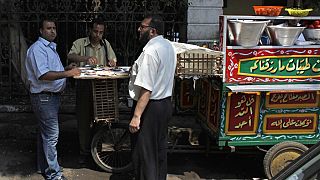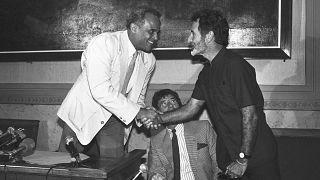Nigeria
Traders at the Esuk Mba market in Calabar, Southern Nigeria are bartering to combat growing inflation.
The ancient practice in the capital of Cross River State was started in 1956 and still operates on a barter trade system, where no money is exchanged for goods.
Effiong Ekpo is has been in the trade for about 20 years.
“I have been trading in this market for about 20 years, I do come here to collect different goods, water-leaf, periwinkles, fish, okra, I will collect them and exchange with what I have.”
Traders sell various produce including vegetables, fruits, fish, and palm oil among others.
Residents say they usually collect money when visitors tour the region or when they sell their goods outside the community.
They only use cash to pay a few bills like school fees.
According to Akpabuyo traditional ruler, Chief Edem Duke, “trade by barter can never be abolished here in Cross Rivers State, in as much as Akpabuyo is concerned and Esuk Mba in general. We cannot abolish the system.”
Swapping one type of goods for another instead of cash is an age-old practice, and has helped combat increasing food scarcity in rural areas in parts of Africa.






![Africa's hight cost of climate change [Business Africa]](https://static.euronews.com/articles/stories/08/77/73/84/320x180_cmsv2_065e40c7-90d8-5143-b8da-c4885db015dc-8777384.jpg)






Go to video
Ghana overtakes Nigeria in U.S. visa overstay rates, new report reveals
01:00
Chidimma Adetshina crowned Miss Universe Africa and Oceania
01:29
Political analyst says Donald Trump's win moves US to the right
01:05
Nigeria: Tinubu orders release of child protestors
Go to video
Nigerian MP caught on camera assaulting delivery driver
01:00
Pics of the day: October 29, 2024